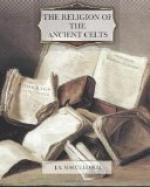[1151] Life of S. Fechin of Fore, RC xii. 333; Life of S. Kieran, O’Grady, ii. 13; Amra Cholumbchille, RC xx. 41; Life of S. Moling, RC xxvii. 293; and other lives passim. See also Plummer, Vitae Sanctorum Hiberniae.
[1152] Adamnan, ii. 34. This pebble was long preserved, but mysteriously disappeared when the person who sought it was doomed to die.
[1153] Wodrow, Analecta, passim; Walker, Six Saints of the Covenant, ed. by Dr. Hay Fleming.
CHAPTER XXII.
THE STATE OF THE DEAD.
Among all the problems with which man has busied himself, none so appeals to his hopes and fears as that of the future life. Is there a farther shore, and if so, shall we reach it? Few races, if any, have doubted the existence of a future state, but their conceptions of it have differed greatly. But of all the races of antiquity, outside Egypt, the Celts seem to have cherished the most ardent belief in the world beyond the grave, and to have been preoccupied with its joys. Their belief, so far as we know it, was extremely vivid, and its chief characteristic was life in the body after death, in another region.[1154] This, coupled with the fact that it was taught as a doctrine by the Druids, made it the admiration of classical onlookers. But besides this belief there was another, derived from the ideas of a distant past, that the dead lived on in the grave—the two conceptions being connected. And there may also have been a certain degree of belief in transmigration. Although the Celts believed that the soul could exist apart from the body, there seems to be no evidence that they believed in a future existence of the soul as a shade. This belief is certainly found in some late Welsh poems, where the ghosts are described as wandering in the Caledonian forest, but these can hardly be made use of as evidence for the old pagan doctrine. The evidence for the latter may be gathered from classical observers, from archaeology and from Irish texts.
Caesar writes: “The Druids in particular wish to impress this on them that souls do not perish, but pass from one to another (ab aliis ... ad alios) after death, and by this chiefly they think to incite men to valour, the fear of death being overlooked.” Later he adds, that at funerals all things which had been dear to the dead man, even living creatures, were thrown on the funeral pyre, and shortly before his time slaves and beloved clients were also consumed.[1155] Diodorus says: “Among them the doctrine of Pythagoras prevailed that the souls of men were immortal, and after completing their term of existence they live again, the soul passing into another body. Hence at the burial of the dead some threw letters addressed to dead relatives on the funeral pile, believing that the dead would read them in the next world."[1156] Valerius Maximus writes: “They would fain




